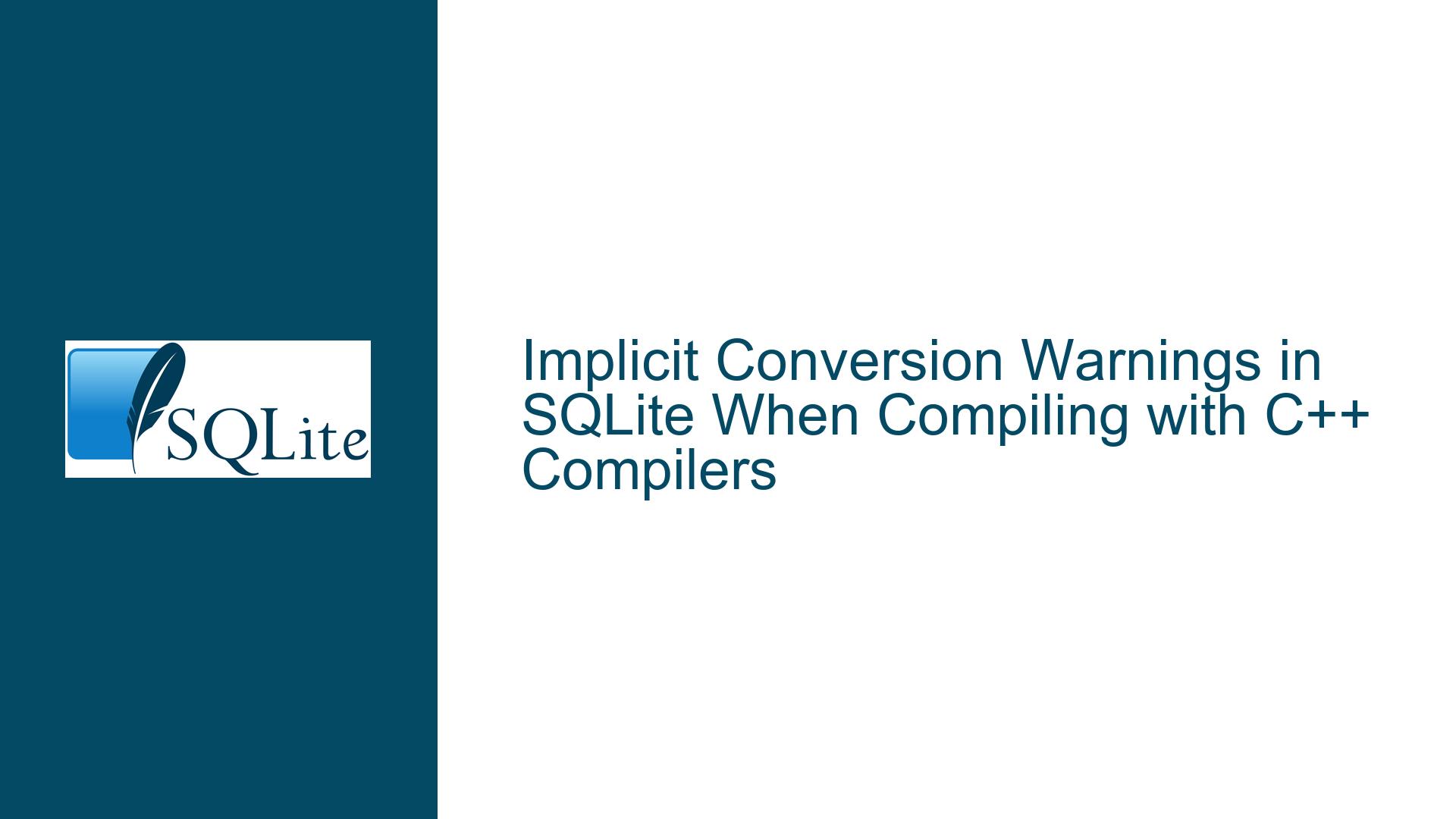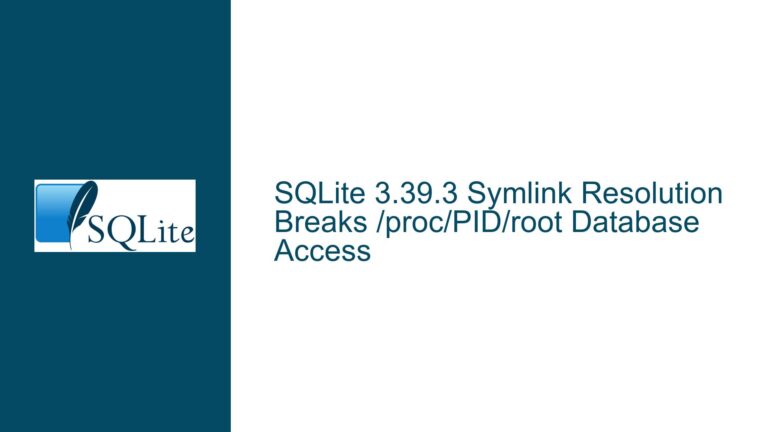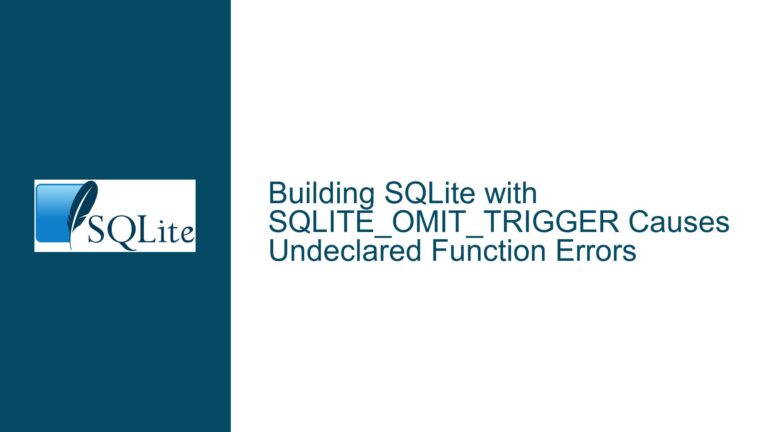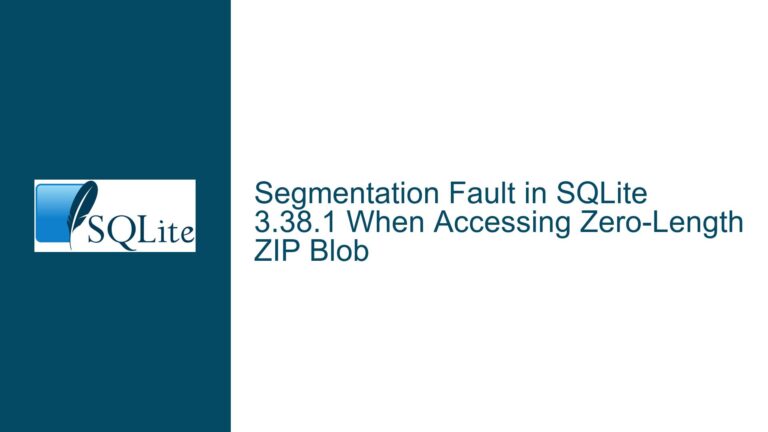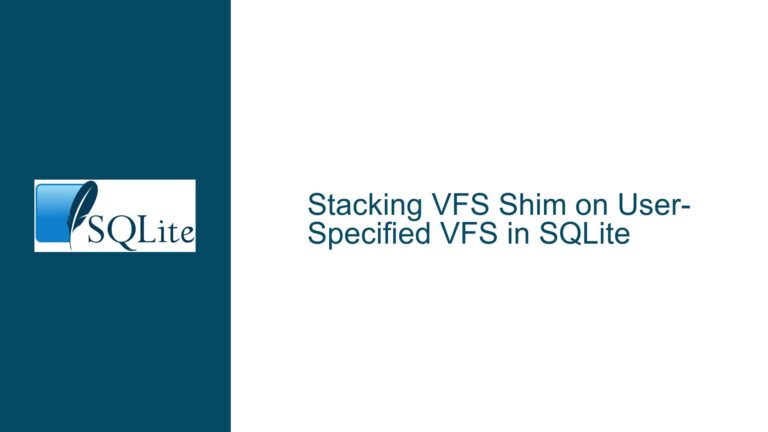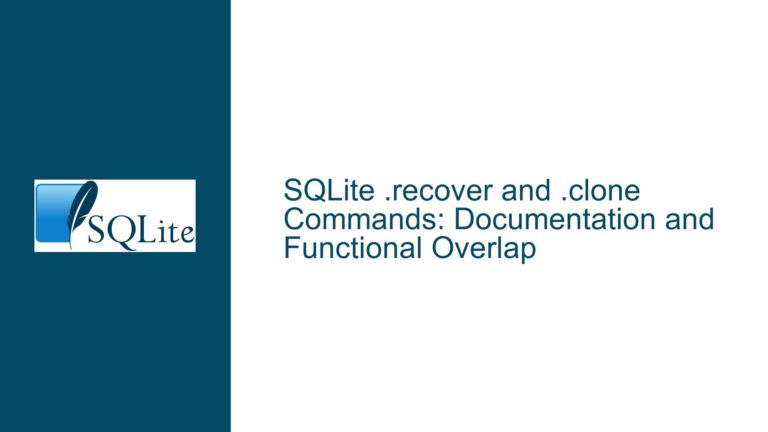Implicit Conversion Warnings in SQLite When Compiling with C++ Compilers
Implicit Conversion Warnings in SQLite Codebase
The core issue revolves around implicit conversion warnings that arise when compiling the SQLite codebase, specifically sqlite3.c, using a C++ compiler such as the one provided by Xcode. These warnings occur due to assignments between variables of different types, particularly when a long long (64-bit integer) is assigned to an int (32-bit integer). While such assignments are common in C, they can trigger warnings in C++ compilers due to stricter type-checking rules. The warnings highlight potential data loss or undefined behavior if the value of the long long variable exceeds the range of the int type.
For example, the following line in sqlite3.c triggers a warning:
int szPage = pPager->pageSize;
Here, pPager->pageSize is of type i64 (equivalent to long long), while szPage is an int. The C++ compiler flags this as a potential issue because the assignment could result in data truncation if pPager->pageSize contains a value outside the range of a 32-bit integer.
The warnings are not present when compiling with a C compiler, even with stringent warning flags like -Wall and -Wextra. This discrepancy arises because C++ enforces stricter type safety compared to C, and C++ compilers are more aggressive in flagging implicit conversions that could lead to data loss or undefined behavior.
C++ Compiler Strictness and Implicit Conversion Warnings
The root cause of these warnings lies in the differences between C and C++ type systems and how compilers handle implicit conversions. In C, implicit conversions between integer types are generally allowed without warnings, even if they involve narrowing conversions (e.g., assigning a long long to an int). This is because C prioritizes flexibility and assumes that the programmer knows what they are doing. However, C++ takes a more cautious approach, as narrowing conversions can lead to subtle bugs and data loss.
When compiling SQLite with a C++ compiler, the following factors contribute to the warnings:
Stricter Type Checking in C++: C++ compilers enforce stricter type-checking rules compared to C. Implicit conversions that could result in data loss or undefined behavior are flagged as warnings or errors, depending on the compiler settings. This is particularly true for narrowing conversions, such as assigning a 64-bit integer to a 32-bit integer.
Compiler Warning Flags: The warnings are more likely to appear when specific warning flags are enabled. For example, the
-Wconversionflag in Clang and GCC explicitly enables warnings for implicit conversions that could lead to data loss. While-Walland-Wextraenable many useful warnings, they do not include-Wconversionby default. This means that developers must explicitly enable this flag to catch implicit conversion warnings.Compiler-Specific Behavior: Different compilers may handle implicit conversions differently. For instance, Clang and GCC may produce warnings for certain implicit conversions, while other compilers might not. Additionally, the version of the compiler and the platform being used can influence whether warnings are generated.
C++ Compilation of C Code: SQLite is written in C, but it is being compiled as C++ in this scenario. While C++ is largely compatible with C, there are subtle differences in how the two languages handle type conversions and other language features. Compiling C code as C++ can expose issues that would otherwise go unnoticed in a pure C environment.
Resolving Implicit Conversion Warnings with Explicit Casts and Compiler Flags
To address the implicit conversion warnings, developers can take several approaches, depending on their specific requirements and constraints. These approaches include modifying the SQLite codebase, adjusting compiler settings, and ensuring that the code is compiled with the appropriate compiler.
1. Explicit Type Casting
The most straightforward solution is to add explicit type casts to the SQLite codebase where implicit conversions occur. This approach ensures that the compiler understands the developer’s intent and suppresses warnings related to potential data loss. For example, the line:
int szPage = pPager->pageSize;
can be modified to:
int szPage = (int)pPager->pageSize;
This explicit cast indicates that the developer is aware of the potential for data loss and has intentionally chosen to perform the conversion. While this approach resolves the warnings, it requires careful consideration to ensure that the cast does not introduce bugs or undefined behavior.
2. Enabling Compiler Warning Flags
Developers can enable specific compiler warning flags to catch implicit conversions and other potential issues. For example, the -Wconversion flag in Clang and GCC explicitly enables warnings for implicit conversions that could lead to data loss. To enable this flag in Xcode, developers can follow these steps:
- Open the Xcode project and navigate to the "Build Settings" section.
- Locate the "Other C Flags" or "Other C++ Flags" option.
- Add
-Wconversionto the list of compiler flags.
Enabling this flag ensures that the compiler generates warnings for all implicit conversions, allowing developers to identify and address potential issues early in the development process.
3. Compiling SQLite as C Code
Since SQLite is written in C, compiling it as C++ can introduce unnecessary complications and warnings. Developers should ensure that the SQLite codebase is compiled using a C compiler rather than a C++ compiler. This can be achieved by configuring the build system to use the appropriate compiler and ensuring that the source files are treated as C code.
For example, in Xcode, developers can specify the compiler for each source file by setting the "Compile Sources As" option to "C" in the build settings. This ensures that the SQLite code is compiled as C, avoiding the stricter type-checking rules of C++.
4. Range Checking and Validation
In cases where implicit conversions are unavoidable, developers can implement range checking and validation to ensure that the values being assigned are within the valid range of the target type. For example, before assigning a long long value to an int, developers can check whether the value is within the range of a 32-bit integer:
if (pPager->pageSize >= INT_MIN && pPager->pageSize <= INT_MAX) {
int szPage = (int)pPager->pageSize;
} else {
// Handle the error or use an alternative approach
}
This approach ensures that the conversion is safe and prevents data loss or undefined behavior. However, it requires additional code and may impact performance, so it should be used judiciously.
5. Updating the SQLite Codebase
For long-term maintainability, the SQLite development team may consider updating the codebase to address implicit conversions and other potential issues. This could involve:
- Adding explicit type casts where necessary.
- Using consistent data types to avoid unnecessary conversions.
- Documenting the rationale behind specific type choices and conversions.
While this approach requires significant effort, it can improve the robustness and portability of the SQLite codebase, making it easier to compile and maintain across different platforms and compilers.
6. Compiler-Specific Workarounds
In some cases, developers may need to implement compiler-specific workarounds to suppress warnings or handle implicit conversions. For example, some compilers provide pragmas or attributes that can be used to disable specific warnings for a section of code. While this approach should be used sparingly, it can be useful in situations where modifying the codebase is not feasible.
7. Testing and Validation
Regardless of the approach taken, developers should thoroughly test and validate their changes to ensure that they do not introduce new bugs or regressions. This includes:
- Running the SQLite test suite to verify that the changes do not break existing functionality.
- Testing the code on different platforms and compilers to ensure compatibility.
- Performing manual testing to identify any edge cases or unexpected behavior.
By following these steps, developers can effectively address implicit conversion warnings in the SQLite codebase while maintaining the integrity and performance of the software.
